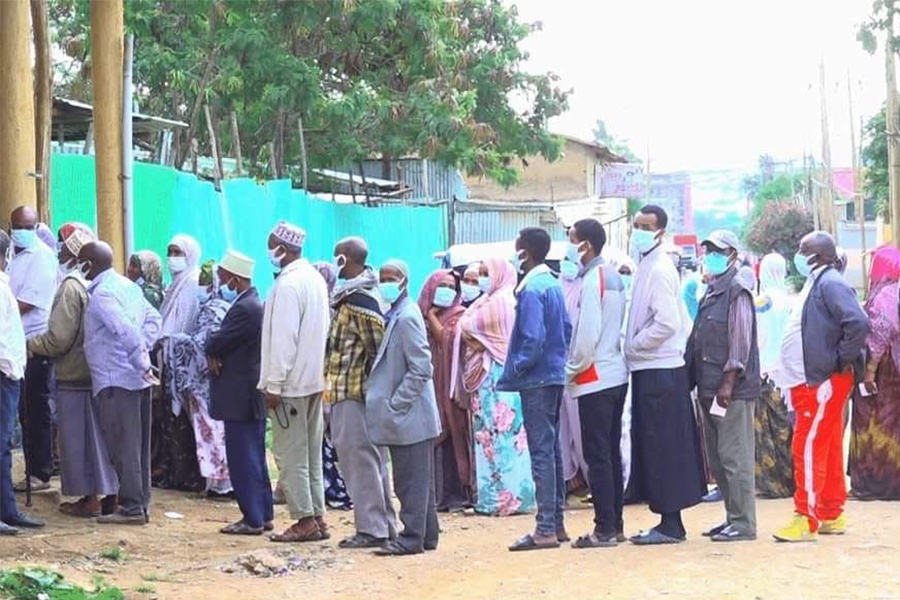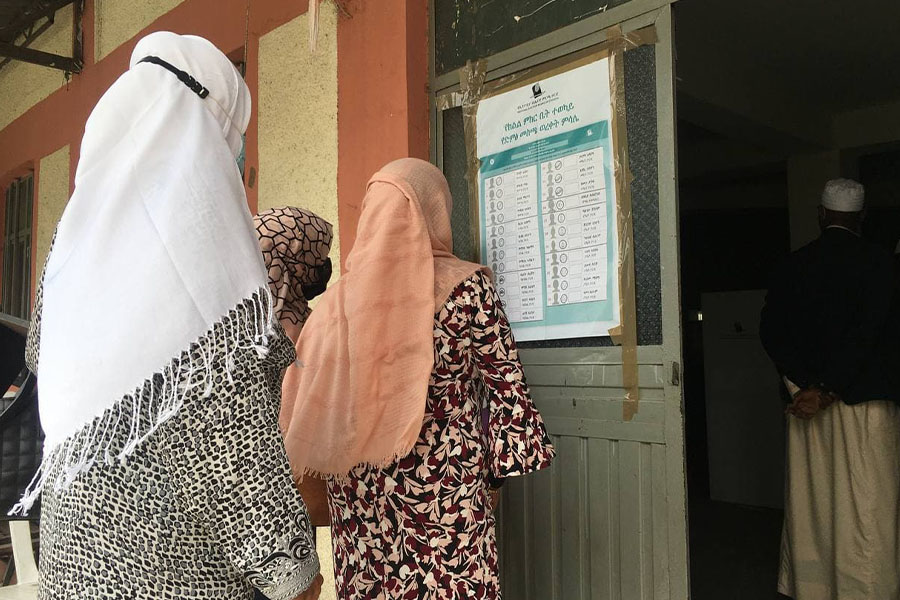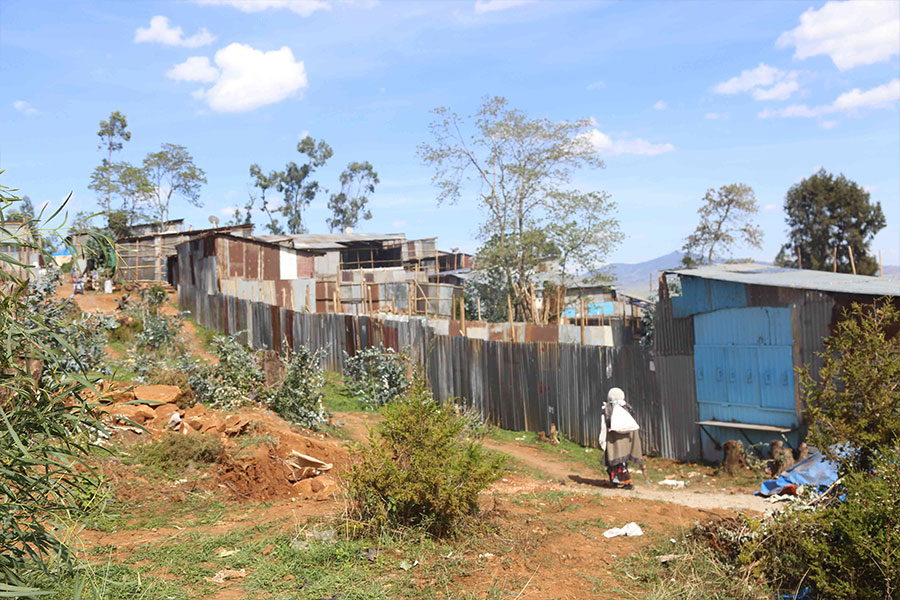
In the late afternoon of Tuesday, February 11, 2020, Chaltu Abedela, 40, was in front of her small shop that sells very few fast-moving consumer goods. Surrounded by three of her seven children, she was engaged in conversation with her neighbour, another shop owner.
She is among 1,224 people who are living in Dereto area, seven kilometres from Sebeta, after being displaced from Jigjiga, the capital of Somali Regional State.
Chaltu, born and raised in Jigjiga, used to lead a good life two years ago with the income she obtained from a restaurant and a Bajaj she used to own. Her husband, who drives an Isuzu truck, also earned a decent income, and their family lived a modest but comfortable life with all their needs fulfilled.
But all that changed on a day two years ago when a large-scale conflict broke out in Jigjiga. Tensions along the border between the Somali and Oromia regional states suddenly gave way to community violence.
"We were in our neighbourhood when we heard that the city was engulfed in chaos," she told Fortune, "and we had to leave immediately with nothing more than what we had on our backs."
Chaltu was among the 2.9 million newly displaced people due to conflicts engulfing Ethiopia during 2018. The figure made Ethiopia the fifth largest nation of internally displaced people in the world. Syria leads the list with 6.8 million followed by Congo, Iraq and South Sudan.
"I lost all of my property," she says. "The only reason me and my family survived the horrible incident was that we left the area immediately."
After fleeing from her home, Chaltu arrived in Addis Abeba with other displaced households.
But things were not comfortable in the capital for them. They settled in a camp at Dereto, a town located in the Oromia Special Zone, an area surrounding Addis Abeba and close to Sebeta town.
After settling them, the government provides them with 15Kg of rice and a half-litre of oil for each family member of a household on a monthly basis, but it is not enough for them to survive.
The displaced in the area sell the food items they receive from the government to be able to afford other necessary fast-moving consumer goods like soap, sugar, flour, tomato, onions and bread. Noticing this, Chaltu opened a shop in the camp five months ago.
There are about 100 shops located in the camp.
"Many people come and buy goods for their daily consumption after they sell the food items given to them by the government," Chaltu said.
The displaced have a serious financial problem, since the local community does not offer them many jobs. A UN-funded report shows that only 31pc of the surveyed displaced persons in the camp engage in income-generating activity, only earning 56 dollars a month on average.
The displaced people in the area are living in steel sheet metal houses, which are very hot when it is sunny and near freezing at night.
Displaced students attend their class at Merisa Elementary School near Legetafo City.
There are a school and a health centre that provide education and health care for free for the internally displaced persons (IDPs). However, parents who used to send their children to better schools before they were relocated are not satisfied.
The health facility also does not have a laboratory and is unable to treat complications. When advanced treatments are needed, patients are referred to facilities in the town of Sebeta, or in the capital city, half a day away on foot.
In spite of the increasing need for health care, 51pc of the displaced community reported having less access than before their displacement, according to the latest survey from ReliefWeb, a specialised digital service of the UN Office for the Coordination of Humanitarian Affairs (OCHA) and an information source on global crises and disasters.
The school provides free education but only goes up to grade four, and it is too small to accommodate the children, according to Chaltu.
Another displaced person who has settled in Dereto is Remeda Ismael, a single mother of three.
Because the floor of the house she occupies has no cement, Remeda's two-year-old child was attacked by ants.
There is nothing in her home except for a mattress, a stove, cooking utensils and a plastic bag containing some clothes. Her house is also made from steel sheet metal like the rest of the others.
Remeda was a businesswoman in Jigjiga and had a good income.
"But now I have nothing left," Remeda says, wiping tears from her eyes.
But she cannot spend much time dwelling on the past now that her family has so many unmet needs on a day-to-day basis. Lately, that unmet need is water.
"There is no water to wash our clothes or take a shower," she says.
The water authority delivers water twice a week by truck. To distribute water to all the families, the households in the camp are not permitted to have more than 20lt of water every time the truck comes. Because of this, Remeda spends an additional five Birr every week to buy water from private suppliers that transport it from a nearby town.
A shortage of electric power is another challenge for the residents of the area. They buy electricity using their prepaid cards with the money they get after selling the food items, but it is not enough to serve them for the whole month. Some of them, including Remeda, walk to the nearby forest to collect wood for cooking their meals.
"If the guards who look after the forest capture us, they beat us," Remeda complains.
Among the reported displaced who fled Somali Regional State, 512 households settled in Legetafo at Merisa and Ferdo areas are provided with food aid by the government.
Legetafo City Administration plans to provide better infrastructure and provisions such as electric power, water, a health centre, an elementary school and kebele identification cards to enable them to live there permanently.
The administration is working to integrate the displaced with the local community, according to Alemu Bereqe, head of the Legetafo Mayor's Office.
"We encourage the local community to send their children to the school constructed for the displaced," Alemu said.
However, no family has sent their children to this school that was built by donations from a private refrigerator assembly plant in the area. According to Mesfine Taye, director of the Merisa Elementary School and who lives in the camp, parents in the local community afford to send their kids to other schools. The school inside the camp was built for two million Birr by Beyo Plc.
“We have to contribute to the society as citizens,” said Shege Desalegn, human resources manager at the plant. "Our technicians support the displaced when there is a technical failure of electricity."
A total of 656 students are attending the school, which has eight classrooms and 13 teachers who work in two shifts. One classroom accommodates an average of 110 students.
"We don't even have a computer to write a report," Mesfin said.
Since the school is made of steel metal sheeting, there is unbearable heat during the daytime, causing most students to sleep in class, according to the director.
The school also does not have access to water, and the toilets for students are kept locked to avoid the smell from the lavatories that disturb the class.
The school only provides education up to the fourth grade; after that, the students have to walk for half an hour to get to Dale Elementary School, as their families cannot afford taxi fares.
"The students are easily upset and aggressive, because they do not get enough food, but we always try to understand and tolerate them," says Mesfin.
There are over 1.4 million displaced children of school-going age in Ethiopia. One million of these, accounting for 70pc, are out of school, of whom half are girls.
More resources are needed to address these challenges. Yet funding for education in emergencies has historically been low. In 2019, the education component of the Humanitarian Plan for Ethiopia needed 44.6 million dollars, yet only 12pc of the total budget was funded. This year, 30 million dollars is required for emergency education.
Nationwide, 107 schools were completely destroyed in the current conflicts. Another 621 schools are partially damaged, 282 schools have been closed, and 94 schools were closed without suffering damage, according to Education Cannot Wait, which is administered under UNICEF.
The health centre located inside the camp has a shortage of equipment and human resources with only two people providing services currently.
There are about 80 people who visit the health centre a day, but most of the problems are related to lack of nutrition, according to Tamiru Negassa, a health officer at the clinic for the displaced.
Most of the displaced need to go to better health facilities, but they cannot afford it. Dabu Abedela is one such individual.
"What they have provided for us is not adequate, and our brothers and sisters are dying because of the absence of a better health care facility," Dabu said.
Tamiru agrees with her.
"Because of the shortage of medicine," he said, "we give injections even for children who should have taken syrup."
On top of the lack of medical and social service shortages, the displaced complain that food aid does not come on time every month.
"Sometimes, it is delayed for days," Dabu said.
At least one expert believes these delays are a sign that the current structure of relief services is unsustainable.
"The psychological impact on displaced people is considerable, and resource competition is another factor,” says Yilebes Addisu (PhD), department head of the Disaster Risk Management & Sustainable Development Department at Bahir Dar University. “Most of them are unemployed, and this will increase robberies."
Furthermore, he believes that providing food aid for two years is inappropriate. The government should send them back to their original place or create sustainable conditions for them where they can generate income, urges Yilebes.
“The government didn’t carry out its responsibility and send them back to where they were displaced from,” Yilebes said. "But still, it is not too late to send them back.
However, Chaltu, who is traumatised from the experience of fleeing violence, says that she does not want to go back to her former area, fearing the same incident could happen to her family again.
"I don't want to die," she said.
Questions of returning the displaced to their original homes or making their current homes permanent is a question for the National Disaster Risk Management Commission. But Debebe Zewdu, communications director at the Commission, declined to comment on the issue.
PUBLISHED ON
Feb 18,2020 [ VOL
20 , NO
1034]

Fortune News | Sep 30,2021

Films Review | Feb 01,2020

Fortune News | Sep 30,2021

Radar | Feb 15,2020


In-Picture | Jun 29,2025

Viewpoints | Apr 29,2023

Radar | Nov 28,2021

Radar |

Fortune News | Jul 14,2022

Dec 22 , 2024 . By TIZITA SHEWAFERAW
Charged with transforming colossal state-owned enterprises into modern and competitiv...

Aug 18 , 2024 . By AKSAH ITALO
Although predictable Yonas Zerihun's job in the ride-hailing service is not immune to...

Jul 28 , 2024 . By TIZITA SHEWAFERAW
Unhabitual, perhaps too many, Samuel Gebreyohannes, 38, used to occasionally enjoy a couple of beers at breakfast. However, he recently swit...

Jul 13 , 2024 . By AKSAH ITALO
Investors who rely on tractors, trucks, and field vehicles for commuting, transporting commodities, and f...

Oct 11 , 2025
Ladislas Farago, a roving Associated Press (AP) correspondent, arrived in Ethiopia in...

Oct 4 , 2025
Eyob Tekalegn (PhD) had been in the Governor's chair for only weeks when, on Septembe...

Sep 27 , 2025
Four years into an experiment with “shock therapy” in education, the national moo...

Sep 20 , 2025
Getachew Reda's return to the national stage was always going to stir attention. Once...